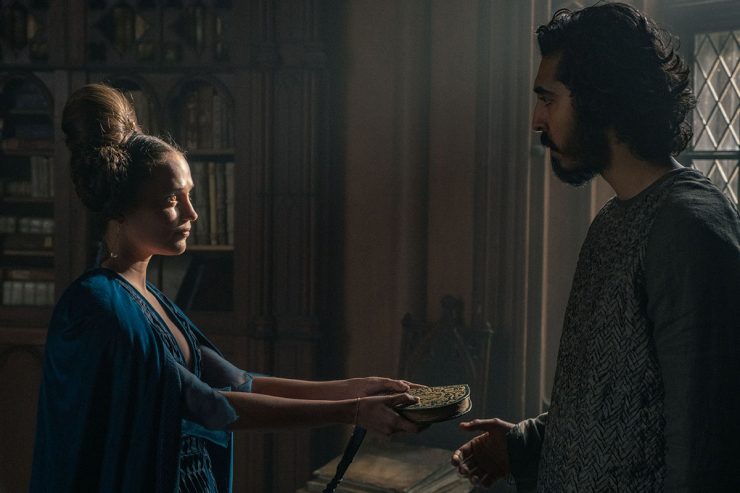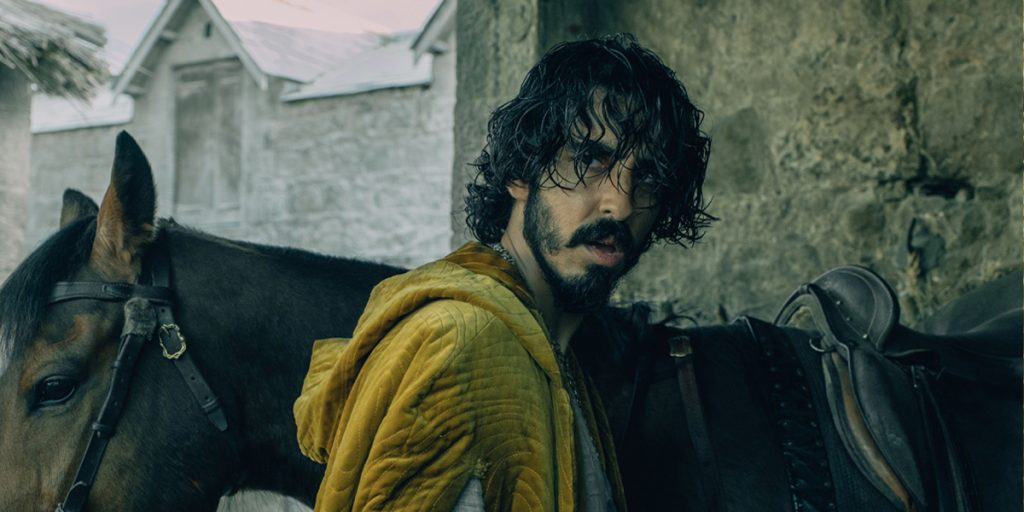The Green Knight is a mesmerizing and marvelously crafted masterwork from director David Lowery, who effortlessly enlivens the Arthurian legend of yore.
Tales of Arthurian legend are certainly nothing new in cinema. Sure, between the heralded hits (Monty Python and the Holy Grail), epic animated endeavors (The Sword and the Stone), and box office bombs (King Arthur: Legend of the Sword), quality certainly may not be consistent, but most audiences are still aware of the adventures of Arthur and his Knights of the Round Table in some capacity. However, should you think you have it all figured out and head into David Lowery’s The Green Knight expecting the “same old same old” when it comes to Arthurian chronicles, you’re in for quite the surprise. Lowery’s work here is no regular adaptation of “Sir Gawain and the Green Knight” – it’s a reimagination, a revitalization that breathes new life into an age-old legend and upends ideas for what a film of this ilk should “look like.” If you come anticipating arresting action and sumptuous stuntwork, The Green Knight isn’t your film. However, those willing to engage with its pensive plot and meditative musings on heroism, honor, and the history we leave behind should be satisfied splendidly.
The troubles of Sir Gawain (Dev Patel, of Slumdog Millionaire and Lion) begin one ominous Christmas night, after he has traveled to take part in a gathering hosted by his uncle, King Arthur (Sean Harris, of Mission: Impossible and Prometheus). While all seem sanguine and still at the start, this mood is succinctly spoiled with the arrival of towering, tree-like creature of a green hue – the titular “Green Knight” (Ralph Ineson, of The Witch and Harry Potter) – who comes with a challenge, asking one of the Knights of the Round Table to step forward and strike him with his own axe, under the condition that they meet him again one year later and receive a blow from him in return. Initially, Arthur’s knights bristle at this dare, seeing as it would likely result in nothing but their eventual death. However, when the Green Knight chastises them for their cowardice, Arthur reluctantly steps up, refusing to let his men endure such scorn. And yet, it is Gawain who swoops in at the last second to take his place, eager to prove himself to the people who view him as nothing but a lost soul with little direction in his life.
When Gawain goes to lop off the head of the Green Knight, the perplexing being puts up no fight, wholly submitting himself to brash young man, who goes through with the act with abundant aggression. After the deed is done, the Green Knight picks up his severed head, eerily utters the words “One year hence,” and rides off on his horse into the distance, laughing heartily throughout the entire trip, and upon completing this task, Gawain becomes a sort of celebrity, worshipped by those near and far for his considerable courage and chivalry. Unfortunately, he is largely unable to cherish such celebration, as he’s haunted by the Green Knight’s words and the constant reminder that their challenge is not yet fully finished. When that date arrives, Gawain initially drags his feet, but he is heartened by Arthur, who assures him that this is the only way he can preserve his legacy and truly become the brave warrior he longs to be. And so, off he goes on a crusade to the elusive “Green Chapel,” intent to see this endeavor through to the end and resolve his row with the Green Knight.

The first thing audiences have to understand about The Green Knight is that it’s not your stereotypical “rock-em’-sock-em’” action fantasy film that solely focuses on spectacle-filled fight sequences to capture the climate of Camelot. No, Lowery is instead more concerned with what makes a hero “a hero” beyond their talents on the battlefield. As such, The Green Knight is a far subtler story, one which demands incessant investment from viewers in order to reach its rewarding resolution. That’s not to say the film is a “slog” in any sense – quite the contrary – but only that it requires patience to realize its true potential. And believe that the taxing trek Patel’s Gawain takes is absolutely worth it. Lowery’s intention with this adaptation is to be more faithful to the feeling of the text than fidelitous to every particular plot point, and such a story choice delivers in spades; it’s as if Lowery is in conversation with the classic tale, challenging its ideas of “the ideal man” and what “he” must do to prove himself to his people by making Gaiwan’s emotional and existential tests just as punishing as his physical plights.
Some may find the story slightly “repetitive” as a result, with the second half largely structured around a series of strange encounters Gawain has with individuals such as a ghostly woman named Winifred (Erin Kellyman, of The Falcon and the Winter Soldier) and a lascivious Lord (Joel Edgerton, of Star Wars) and his Lady (Alicia Vikander, of Ex Machina) – all of which convey crucial lessons – and interspersed with long stretches of near-silent strolling through the countryside. With that being said, these beats are utterly crucial to the thematic core of The Green Knight, and Lowery’s plotting places us in the psyche of Gawain perfectly. Rarely has a movie about “a mighty quest” so authentically approximated the actual experience of enduring such an extreme event, with Lowery skillfully nailing both the internal and external strife. It’s a bold bet that pays off beautifully, making for a medieval epic that is not only aesthetically engrossing but truthfully transporting as well.
Additionally, the direction on display here is just as daring as Lowery’s striking storytelling sensibilities, with the first act serving as some of the finest filmmaking we’ve seen in the 21st Century, period. Lowery’s masterful grasp on mood is apparent from the first frame, as he enraptures audiences with images that are awfully alarming yet still oh so alluring. Everything from Gawain’s introduction to the Green Knight’s dastardly dare could be preserved as a perfect piece of short-form fiction, consistently escalating intensity until crowds can’t take it anymore – and only then, when we’re at our weakest, does Lowery let us breathe. Thankfully, the saga that follows is just as stunning, with Lowery never failing to sell the staggering scope and scale of such a feat, assisted by consuming cinematography courtesy of Andrew Droz Palermo (A Ghost Story, You’re Next) and stellar set design from Jade Healy (Marriage Story, I, Tonya), to say nothing of Daniel Hart’s (A Ghost Story, The Old Man & the Gun) horrifically haunting/hypnotic score. Simply put, every technical element works in tandem to create one of the most captivating cinematic odysseys ever captured in film.
And, thankfully, Lowery is backed up by a brilliant ensemble cast that completely surrenders to his valiant vision, performing each part with positively persuasive power, led by a diligent and dedicated Dev Patel. At this point, it’s no surprise that the Academy Award-nominated actor is a marvelously magnetic leading man, but The Green Knight asks more of him than any prior role, both corporeally and creatively, and he wildly exceeds expectations. With reckless abandon, he inhabits every inch of Gawain, compellingly conveying the entirety of his emotional commitment to this quest and the brutal costs of such a burden. Equally exhilarating is his personal evolution from a brazen boy to a more meditative and melancholic man, humbled by having his honor tested time and time again. Amongst the supporting cast, there’s nary a weak link – from Harris’ absorbing King Arthur to Edgerton’s lively Lord – but it’s Alicia Vikander who stands out most of all, deftly balancing dual roles (Gawain’s seductive sweetheart Esel and the bewitching wife of Edgerton’s character) with dynamic differentiation and allowing us to bear witness to her best work since Ex Machina and The Danish Girl.
The Green Knight may not provide the pulse-pounding Arthurian action that some audiences desperately wish to see, but those who stick it out regardless will find themselves swept up in a work of audacious art, unlike any other project being put in cinemas at the moment. In both his screenwriting and his direction, David Lowery fires on all cylinders, effortlessly enlivening these legends of yore and delicately dissecting the substance and significance of the stories we hold so near and dear today. Aided by a cast who matches his craft with their own consummate contributions, Lowery makes what can only be described as a near-masterwork of the film medium.
The Green Knight was released in US theaters on July 30, 2021.

